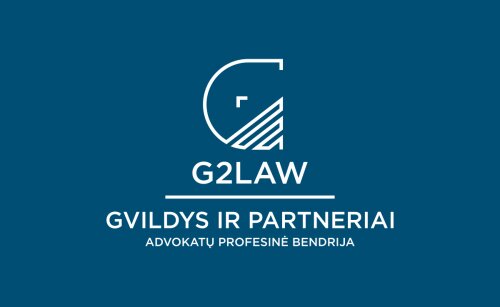Best Water Law Lawyers in Klaipėda
Share your needs with us, get contacted by law firms.
Free. Takes 2 min.
List of the best lawyers in Klaipėda, Republic of Lithuania
About Water Law in Klaipėda, Republic of Lithuania
Water Law in Klaipėda, as in the rest of Lithuania, is designed to regulate the use, protection, and management of water resources. Klaipėda is notable for its strategic position by the Baltic Sea, including its rivers, ports, groundwater, and coastal areas, all of which present unique legal challenges and responsibilities. Lithuanian Water Law is governed by national legislation, European Union directives, and municipal regulations, all ensuring the sustainable, safe, and fair use of water resources for public, industrial, and private needs.
Why You May Need a Lawyer
There are numerous situations where individuals, businesses, and organizations may require the assistance of a Water Law lawyer in Klaipėda. Common scenarios include disputes over water rights and access, permits for water use or construction near water bodies, pollution and contamination issues, fishing and aquaculture concerns, flood management, and compliance with environmental regulations. Navigating the intersection of national and local rules, addressing fines or penalties, and engaging with regulatory authorities are also frequent reasons to seek legal counsel.
Local Laws Overview
Water Law in Klaipėda operates within the framework of the Lithuanian Republic's Water Law, which incorporates EU directives such as the Water Framework Directive and Marine Strategy Framework Directive. Key elements include:
- Permits are required for significant water use, wastewater discharges, and construction works affecting water bodies.
- Municipal bylaws further regulate stormwater management, public access to water bodies, and protection of coastal zones.
- Environmental Impact Assessments are mandatory for larger projects near water bodies.
- Strict monitoring and reporting obligations exist regarding water quality, resource use, and waste management.
- Landowners abutting rivers, lakes, or the sea must often maintain buffer zones and respect public access rights.
- Heavy penalties can be imposed for unauthorized discharges, non-compliance with permits, or damage to aquatic ecosystems.
Local institutions, such as the Klaipėda municipality and environmental protection agencies, play a critical role in issuing permits, conducting inspections, and enforcing compliance.
Frequently Asked Questions
What activities require special permits under Klaipėda Water Law?
Drilling wells, extracting groundwater, discharging wastewater, fishing, building within certain proximities to lakes, rivers, or the sea, and any commercial use of surface or groundwater usually require permits from relevant authorities.
Who is responsible for water pollution incidents?
The party causing the pollution - whether an individual, business, or institution - is legally accountable. Liability can include fines, restoration obligations, or even criminal penalties in severe cases.
What should I do if I find illegal dumping near a water body?
Report the incident to the Klaipėda Environmental Protection Department or local municipality. Authorities will investigate and may initiate enforcement actions against the offenders.
Can I build a dock or pier on my property by the water?
Construction of structures near or on water bodies typically requires special permits, environmental impact assessment, and compliance with zoning and conservation regulations. Legal advice is recommended before beginning such projects.
Is public access to beaches and rivers guaranteed?
Yes, Lithuanian law generally ensures public access to natural shores, subject to certain restrictions for safety, environmental protection, or national security. Blocking public pathways can result in legal consequences.
How are disputes over water use resolved?
Most disputes are settled through negotiation, mediation, or administrative review by water authorities. In some cases, court proceedings may be necessary, particularly for unresolved or complex issues.
Which agency regulates water quality in Klaipėda?
The Klaipėda Environmental Protection Department, along with national bodies under the Ministry of Environment, oversee water quality monitoring, enforcement, and licensing.
Is flood protection a legal responsibility?
Both private landowners and municipalities share responsibilities for flood prevention and management. Regulations may require certain flood defense measures or land use restrictions in flood-prone areas.
Do I need a license for recreational fishing?
Yes, licenses are required for most types of recreational and commercial fishing to ensure the sustainability of fish stocks and compliance with conservation measures.
What are typical penalties for violating Water Law?
Penalties can include administrative fines, orders to restore damaged resources, suspension of activities, loss of permits, and, in severe cases, criminal prosecution.
Additional Resources
If you need more information regarding Water Law in Klaipėda, consider reaching out to the following organizations or resources:
- Klaipėda Municipality Environmental Protection Department
- Lithuanian Ministry of Environment
- Lithuanian Environmental Protection Agency
- Local water utility companies
- Non-governmental organizations focusing on environmental protection and water rights
- Legal aid centers and bar associations specializing in environmental and administrative law
Next Steps
If you believe you require legal assistance regarding Water Law issues in Klaipėda, start by gathering all relevant documents, such as permits, correspondence, photos, and records of the issue. Contact a qualified lawyer or legal aid provider with experience in environmental and Water Law matters. Consider arranging a consultation to discuss your situation and potential remedies. Acting promptly can help protect your rights, avoid unnecessary penalties, and ensure compliance with local laws and regulations.
Lawzana helps you find the best lawyers and law firms in Klaipėda through a curated and pre-screened list of qualified legal professionals. Our platform offers rankings and detailed profiles of attorneys and law firms, allowing you to compare based on practice areas, including Water Law, experience, and client feedback.
Each profile includes a description of the firm's areas of practice, client reviews, team members and partners, year of establishment, spoken languages, office locations, contact information, social media presence, and any published articles or resources. Most firms on our platform speak English and are experienced in both local and international legal matters.
Get a quote from top-rated law firms in Klaipėda, Republic of Lithuania — quickly, securely, and without unnecessary hassle.
Disclaimer:
The information provided on this page is for general informational purposes only and does not constitute legal advice. While we strive to ensure the accuracy and relevance of the content, legal information may change over time, and interpretations of the law can vary. You should always consult with a qualified legal professional for advice specific to your situation.
We disclaim all liability for actions taken or not taken based on the content of this page. If you believe any information is incorrect or outdated, please contact us, and we will review and update it where appropriate.













